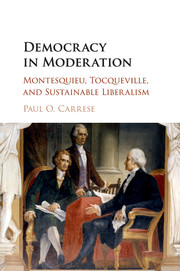Book contents
- Democracy in ModerationMontesquieu, Tocqueville, and Sustainable Liberalism
- Frontispiece
- Democracy in Moderation
- Copyright page
- Dedication
- Dedication
- Contents
- Preface
- Prologue
- Part I Tocquevillean Moderation in Philosophy and Founding
- Part II Moderation and Statesmanship at Home and Abroad
- Epilogue
- Bibliography
- Index
- References
Bibliography
Published online by Cambridge University Press: 05 April 2016
- Democracy in ModerationMontesquieu, Tocqueville, and Sustainable Liberalism
- Frontispiece
- Democracy in Moderation
- Copyright page
- Dedication
- Dedication
- Contents
- Preface
- Prologue
- Part I Tocquevillean Moderation in Philosophy and Founding
- Part II Moderation and Statesmanship at Home and Abroad
- Epilogue
- Bibliography
- Index
- References
- Type
- Chapter
- Information
- Democracy in ModerationMontesquieu, Tocqueville, and Sustainable Liberalism, pp. 204 - 224Publisher: Cambridge University PressPrint publication year: 2016

